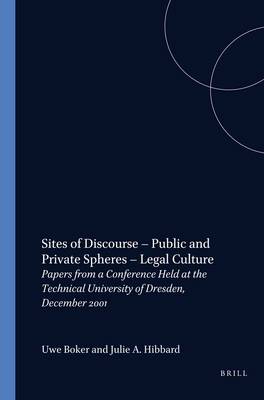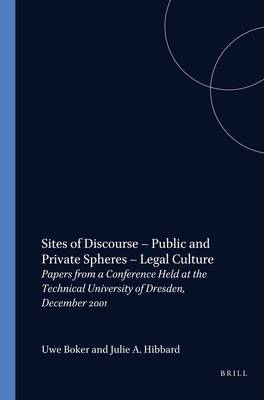
- Afhalen na 1 uur in een winkel met voorraad
- Gratis thuislevering in België vanaf € 30
- Ruim aanbod met 7 miljoen producten
- Afhalen na 1 uur in een winkel met voorraad
- Gratis thuislevering in België vanaf € 30
- Ruim aanbod met 7 miljoen producten
Zoeken
Sites of Discourse - Public and Private Spheres - Legal Culture
€ 123,95
+ 247 punten
Omschrijving
The present collection of essays grew out of a conference, held in Dresden in December 2001, exploring the relationship between the public sphere and legal culture. The conference was held in connection with the ongoing research undertaken by the Sonderforschungsbereich 537 'Institutionalisation and Historical Change' and, in particular, by the project 'Circulation of Legal Norms and Values in British Culture from 1688 to 1900'.
The conference papers include essays on the theory of the public sphere from a systematic and historical point of view by Gert Melville, by Peter Uwe Hohendahl and by Jürgen Schlaeger, all of whom try to re-evaluate and/or improve upon Jürgen Habermas' seminal contribution to the discussion of the emergence of modernism. Alastair Mann's contribution investigates the situation in Scotland, particularly censorship and the oath of allegiance; Annette Pankratz focuses on the king's body as a site of the public sphere; Heinz-Joachim Müllenbrock looks into the widespread 'culture of contention' at the beginning of the eighteenth century; and Eckhart Hellmuth considers the reform movement at the end of the century and the radical democrats' insistence on the right to discuss the constitution.
Ian Bell, who took part in the conference, suggested the inclusion of part of the first chapter of his seminal study Literature and Crime in Augustan England (1991). Beth Swan, Anna-Christina Giovanopoulos, and Christoph Houswitschka respectively analyse the ideologies of justice, the interrelation between journalism and crime, and the juridical evaluation of the crime of incest and its representation in public. Greta Olson investigates keyholes as liminal spaces between the public and the private, Juliet Wightman focuses on theatre and the bear pit, Uwe Böker examines the court room and prison as public sites of discourse, and York-Gothart Mix discusses the German emigrant culture in North America.
The conference papers include essays on the theory of the public sphere from a systematic and historical point of view by Gert Melville, by Peter Uwe Hohendahl and by Jürgen Schlaeger, all of whom try to re-evaluate and/or improve upon Jürgen Habermas' seminal contribution to the discussion of the emergence of modernism. Alastair Mann's contribution investigates the situation in Scotland, particularly censorship and the oath of allegiance; Annette Pankratz focuses on the king's body as a site of the public sphere; Heinz-Joachim Müllenbrock looks into the widespread 'culture of contention' at the beginning of the eighteenth century; and Eckhart Hellmuth considers the reform movement at the end of the century and the radical democrats' insistence on the right to discuss the constitution.
Ian Bell, who took part in the conference, suggested the inclusion of part of the first chapter of his seminal study Literature and Crime in Augustan England (1991). Beth Swan, Anna-Christina Giovanopoulos, and Christoph Houswitschka respectively analyse the ideologies of justice, the interrelation between journalism and crime, and the juridical evaluation of the crime of incest and its representation in public. Greta Olson investigates keyholes as liminal spaces between the public and the private, Juliet Wightman focuses on theatre and the bear pit, Uwe Böker examines the court room and prison as public sites of discourse, and York-Gothart Mix discusses the German emigrant culture in North America.
Specificaties
Betrokkenen
- Uitgeverij:
Inhoud
- Aantal bladzijden:
- 260
- Taal:
- Engels
- Reeks:
- Reeksnummer:
- nr. 64
Eigenschappen
- Productcode (EAN):
- 9789042015500
- Verschijningsdatum:
- 1/01/2002
- Uitvoering:
- Paperback
- Formaat:
- Trade paperback (VS)
- Afmetingen:
- 155 mm x 234 mm
- Gewicht:
- 367 g

Alleen bij Standaard Boekhandel
+ 247 punten op je klantenkaart van Standaard Boekhandel
Beoordelingen
We publiceren alleen reviews die voldoen aan de voorwaarden voor reviews. Bekijk onze voorwaarden voor reviews.







